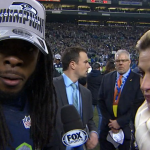Throughout the history of the modern Olympic Games, both democracies and dictatorships have hosted the Games. National leaders spanning the ideological spectrum — everyone from Adolph Hitler to Ronald Reagan — have hosted the Games, and that isn’t about to change anytime soon. Case in point: Russia’s Vladimir Putin.
It doesn’t take much research to know that Putin is not beloved internationally. He’s been called a dictator, a tsar, and a bully. I usually don’t concern myself with politics when I’m watching sports, but this year’s Olympic host gives me pause. Nearly everything Olympics-related that will be seen on television will come as the result of an oppressive regime that squelches human rights that I hold dear (e.g., freedom of speech, freedom of the press, freedom of religion).
Along with a handful of European countries, the United States has taken inaction as a response to Russia’s civil rights record: they’re boycotting the opening ceremonies — neither the President, the First Lady, nor the Vice President will be in attendance — and I suppose that’s appropriate for international politics.
But should my pause at Mr. Putin’s political iron-fistedness extend to an all-out boycott of the Games? It may sound silly, especially when I know that it’s doubtful that my very small involvement could, in some way, support a Russian government where political enemies are sent to who-knows-where for who-knows-how-long. Seriously, though, I wonder.
I live in a culture where boycotts seem to be the ultimate in political expression. Distancing ourselves from the distasteful actions of others is the primary vehicle for voicing our displeasure. You want to show that you’re against something? Move away from it. You want to make it clear that you’re not in favor of someone? Quit interacting with them. Something just doesn’t sit well with you? Tell your friends that you’re no longer participating — and then tell them again on the Internet.
The thought of Vladimir Putin gaining even more power because of the Olympic Games makes me queasy. I’d love to ignore the whole thing and feign ignorance of the Putin controversy.
But here’s what’s also difficult: I love watching the Olympics. It’s a great opportunity to see sports that I never get to see. The winter Olympics, in particular, is always an exotic view of competition for this Southern boy. Where I live in Virginia, skiing is an aquatic activity in the summer and curling is done with barbells at the YMCA.
That touch of the exotic is key to my thinking. While watching the Olympics this year, I’ll see enemies get together, agree on rules for engagement, and then celebrate a winner — even if they aren’t the winner.
These upcoming Olympics, like so many others, gives us all the opportunity to see what happens when people who vehemently disagree with each other come together for a common purpose. Sure, in this case the common purpose may be athletic glory in a sport called “skeleton,” but I’ll take what I can get. Even luge, figure skating, and the biathlon showcases the power of sport to bring enemies together: some of these countries may barely communicate with each other, but they still send athletes to compete.
There’s no great nobility in boycotting sports. True nobility in sports appears when enemies come together, not when they separate. And if I can make this leap, the meeting of opponents can also bring the power of sports into the realm of the transcendent. Two people who oppose each other — or two groups of people — but can still agree to meet often serve to alleviate existing strife.
The most famous example of the power of Olympic sport to transcend political conflict might have come in the 1936 Berlin Olympics. That year, Jesse Owens competed in the newly built Olympic stadium and won the gold medal in the 100 and 200-yard dash, as well the 4×100 relay. His gold medal in the broad jump came, in part, from a tip given to him by then-broad jump champion, Germany’s Carl “Luz” Long. After Owens’s victory, Long joined him in the victory lap around the stadium, waving to the thousands of cheering spectators and, of course, Hitler.
As a spectator, I want to see competition that occurs without political division. I want to see it when a Russian athlete meets an American athlete and they smile and shake hands, their national leaders notwithstanding.
For Christians, the Olympic standard of competition and unity is a rather low one, especially when we remember that we are compelled by Jesus to love our enemies and pray for those who persecute us. It can be tough to remember — especially in our easily offended, boycott-happy culture — that being in close proximity to our enemy is not simply a reflection of maturity, but of Godliness. I’ll be watching this year’s Winter Olympics because I hope an American presence at the Games might reflect a similar extension of good will toward mankind.












